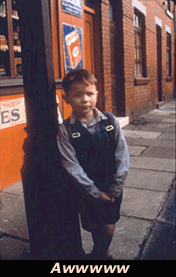**½/****
starring Ian Hart, Claire Hackett, Anthony Borrows, David Hart
screenplay by Jimmy McGovern
directed by Stephen Frears
 by Walter Chaw Liam is an Irish coming-of-age story that has more in common with John Boorman’s The General and Hope and Glory than it does with Alan Parker’s Angela’s Ashes. It balances the deprivation and desperation of growing up with crippling unemployment, a peculiarly sadistic brand of Irish Catholicism, and rising anti-Semitism with a good sense of humour and a lively feeling for pace that better captures the seesawing emotion of childhood than unrelenting horror or unleavened bliss. The truth of childhood, after all, lies somewhere in the grey liminal spaces between William Blake’s songs of innocence and songs of experience, though liberal time is spent in both extremes. In other words, the true power of Liam is not in the now-familiar images of scrounging for bread and cigarettes while enduring whippings at the hand of Sadeian priests, but in the shame of a little boy who walks in on his mother bathing and the embarrassment of a stuttering child unable to say his own name.
by Walter Chaw Liam is an Irish coming-of-age story that has more in common with John Boorman’s The General and Hope and Glory than it does with Alan Parker’s Angela’s Ashes. It balances the deprivation and desperation of growing up with crippling unemployment, a peculiarly sadistic brand of Irish Catholicism, and rising anti-Semitism with a good sense of humour and a lively feeling for pace that better captures the seesawing emotion of childhood than unrelenting horror or unleavened bliss. The truth of childhood, after all, lies somewhere in the grey liminal spaces between William Blake’s songs of innocence and songs of experience, though liberal time is spent in both extremes. In other words, the true power of Liam is not in the now-familiar images of scrounging for bread and cigarettes while enduring whippings at the hand of Sadeian priests, but in the shame of a little boy who walks in on his mother bathing and the embarrassment of a stuttering child unable to say his own name.
The majority of Liam is a wonderful and occasionally harrowing portrait of the cult of childhood, though this kind and observant film falters badly at the conclusion when it aspires to socio-political polemic that’s just too trite. It hums along on the strength of a winning screenplay by Jimmy McGovern (Priest) and a brilliant set of performances from an accomplished ensemble that succeed fabulously in capturing a slice of impoverished life. In avoiding the impulse to have children sharing in the fiscal worries of their unemployed parents and providing for them, appropriately, their own world of triumphs and fears, Frears’s film reaches for the same kind of emotional terrain travelled by Hope and Glory. That Liam is neither as complete nor satisfying as Boorman’s film is a product almost entirely of its last ten minutes–ten minutes that would be more at home in a different, more politically proselytizing and simplistic film. It’s almost as though Frears reached the end of his pleasantly loose narrative and realized that Liam had avoided the traditional arcs of UK depression/coming-of-age films and felt the need to make up for lost time in a hurry.
The key to the film arrives early as pint-sized Liam (gifted newcomer Anthony Borrows) and his older sister Teresa (Megan Burns) spy on their parents (Ian Hart and Claire Hackett) bringing home a New Year’s Eve party from the pub. Drunkenness, dancing, singing, and fighting occur to the equal delight of the kids: they are, after all, up long past their bedtime and delighted witnesses to the forbidden floorshow of adulthood. Liam flourishes when it maintains the mythical distance between the worries of children, adults, and parents. When the distress of the adult world collides with the frights of a child’s growing pains, Liam tries to tackle a weight it isn’t prepared to handle, violating the magic of its own hard-won sense of the voyeuristic eagerness kids have for their pending maturation and the sense of nostalgia adults have for the half-remembered difficulties of youth. Most bizarre and discordant, however, are its attempts to make the film a learning and evolutionary process for Teresa rather than Liam in a manner that is unpleasant, unrealistic, and a frank betrayal of everything that worked for the film to that point.
Yet the strengths of Liam, from Andrew Dunn’s gaslit cinematography and Stephen Finneran’s production design to a remarkable ensemble, are such that one is tempted to try and forget that it went horribly astray in the eleventh hour and grasped for a pat and vaguely insulting resolution. The greatest tragedy of Liam is that it doesn’t have the courage to carry its own modest convictions through to the end.

